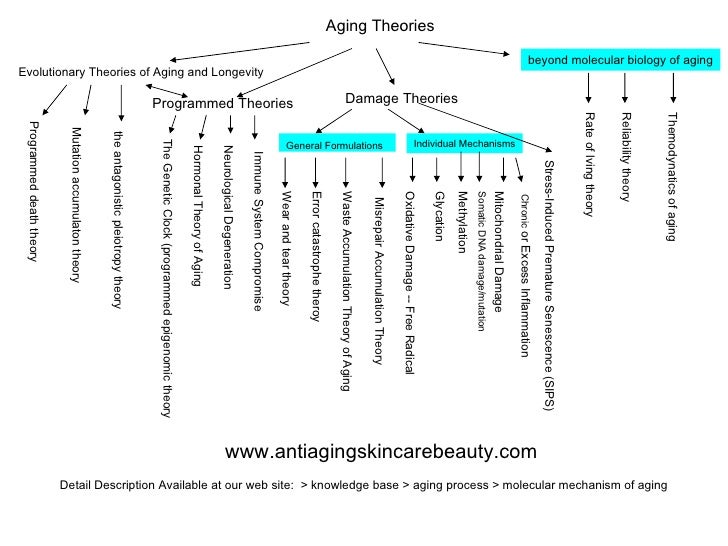Theories On Aging
Aging psychology Chronic Disease prevention control. Theories of aging 1.

Theories Of Aging Theories Of Aging Nursing Theory Aging
Autoimmune Theory which states that the immune system is programmed.

Theories on aging
. Denham Harman postulates that aging is. This decline is linked to excess of the stress hormone cortisol. This impedes its efficiency to.Other theories include the Wear-and-Tear Theory Definition Wear-and-Tear Theory. Theories of Aging Tanvi Pathania MPT 1st Year Geriatrics Physiotherapy 2. Aging by Program where biological clocks act through hormones to control the pace of aging.
That the cell and organism have genetically determined life spans referred to as the Hayflick limit or the biological clock NIA 2003. The free radical theory The crosslink or connective tissue theory Clinker theory. Hormesis is a phenomenon in which low doses of stressors that are normally toxic instead strengthen an organism and make it more resistant to higher doses of the same toxin or stressor.
It explores the effects of some of the rather distinct perspectives on aging that have emerged beginning with the conceptualizations research studies and criticisms of disengagement theory activity theory and role theory leading up to continuity theory and the liberation perspective. Aging is a result of programmed senescence Bengtson Gans Putney Silverstein 2009. This theory understands aging as a process of the human body wearing out.
Wear-and-tear Theory Cellular Aging Theory Immunological Theory Free Radical Theory oxidative stress model. Hormonal Stress Theory also known as Neuroendocrine Theory of Aging suggests that as we age the ability of the hypothalamus to regulate hormones in the body begins to decline leading to metabolic problems American Federation of Aging Research AFAR 2011. Theories of Aging Developmental Genetic Theories Stochastic.
The article discusses the counseling implications and applications of a number of social theories of aging. In the twelfth century thoughts were centered on predetermination and an unalterable plan for life and death. Hormesis is not a theory of aging but it has huge implications for other theories.
When we get to psychosocial theories of aging defined as a focus on social and psychological aspects leading to successful aging we have different ways of defining success and varied ways of. Theories of individual agingactivity theory disengagement theory and continuity theoryalthough premised on normal aging and not fashioned explicitly about individuals aging with long-term physical impairments could be applied to this population by reconceptualizing physical impairment as a variation on a theme. We briefly discuss four primary theories of biological aging.
Theories of aging have been debated since the time of the ancient Greeks. Damage accumulation theories of aging At their most basic level damage accumulation theories of agingsometimes also referred to as error theories of aging or wear and tear theories of agingpostulate that aging is the result of a slow build-up of damage in the body over time. When enough cells are damaged overall functioning of the body is decreased.
The philosopher Maimonides thought that precautions and careful living might prolong life. Social theories of aging. Aging occurs due to random genetic mutations and oxidative stress or.
Theories of Aging. As we grow older the cell membrane becomes less lipid less watery and more solid. Gene Theory which considers aging to be the result of a sequential switching on and off of certain genes with.
The Membrane Theory of Aging The membrane theory of aging was first described by Professor Imre Zs-Nagy of Debrechen University Hungary. Programmed aging theories suggest that aging is the result of predictable cellular death. Unlike the earlier programmed theory of evolution and aging which tried to findreasonswhyevolutionmightfavor aging evolutionary senes-cence theory focuses on the failure of natural selection to affect late-life traits.
The most widely accepted overall theory of aging is the evolutionary senescence theory of aging. Social theories of aging. A review Dis Mon.
CELLULAR THEORIES The cellular theories propose that aging is a process that occurs because of cell damage. Social theories of aging.

Theories Of Aging Theories Of Aging Spiritual Needs Social Behavior

Pin By Leticia Ortiz Cooper On Gerontology Theories Of Aging Gerontology Development

Pin By Gerontology On Theories Of Aging Systems Theory Theories Of Aging Immune System

Theories Of Aging Theories Of Aging Physical Stress Stress Causes

Theories Of Aging Theories Of Aging Theories Spiritual Needs

Pin By Gerontology On Theories Of Aging Theories Of Aging Molecular Methylation

Theories Of Aging Theories Of Aging Theories Spiritual Needs

Sociological Theories Of Aging Lecture 7 Chapter 9 Theories Of Aging Aging Theories
Posting Komentar untuk "Theories On Aging"